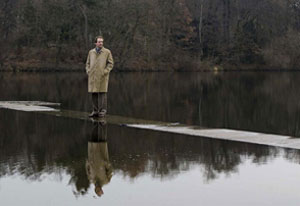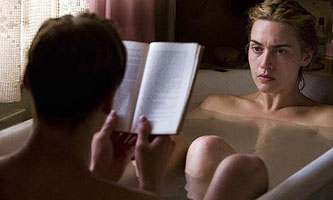In post-Nazi Germany, 15 year old Michael Berg has a chance meeting with an older woman named Hanna when he falls ill in an alley. She cleans him up and sends him on his way, and once home he discovers he has Scarlet Fever. Three months later, after recovering from his ailment, he seeks out Hanna to thank her for helping him. Once there, he notices things around her house that he doesn’t  normally see at home; bras, stockings, and Hanna’s legs. He immediately becomes enamored with her, and begins to show up to her house every day after school to help out with menial tasks. Shortly thereafter, he’s stunned when Hanna returns his feelings and they spark up an illicit love affair. Amidst all of this, Michael finds that Hanna loves to have books read to her, and their relationship continues in this manner until one day Hanna up and leaves without a trace.
normally see at home; bras, stockings, and Hanna’s legs. He immediately becomes enamored with her, and begins to show up to her house every day after school to help out with menial tasks. Shortly thereafter, he’s stunned when Hanna returns his feelings and they spark up an illicit love affair. Amidst all of this, Michael finds that Hanna loves to have books read to her, and their relationship continues in this manner until one day Hanna up and leaves without a trace.
Some years later, Michal has become a law student, and his small class is invited to observe a Nazi war crime trial. Little does he know that one of the women on trial is Hanna, who he hasn’t seen or heard of since the day she disappeared. Horror overcomes him as he hears of the atrocities than Hanna has been accused of while working as an SS officer, including one that hits close to home. He soon realizes that he holds a secret that could help clear Hanna’s name, but speaking up and confronting his past again is another matter altogether.
The Reader shines much brighter as a character study than it does as a film that deals with the Holocaust, and those adverse to films dealing with that subject have nothing to fear here. The tragedy of that period in world history is used as the building blocks for the tumultuous relationship between Hanna and Michael and nothing more, outside of drawing some parallels between the affect Hanna has on almost every person she comes into contact with (something that she seems to be oblivious to). In fact, this story could have been told in any other era, around any other tragedy, and the outcome would be more than likely the same.
Director Stephen Daldry does a marvelous job of handling the early romance between Hanna and Michael, directing the scenes in a fashion that doesn’t shy away from a rather taboo subject. Every scene of the couple showing their love for one another is filmed with unabashed sensuality, to the point where it’s occasionally hard to watch. As a viewer, we fully realize the emotional impact that a relationship like this at such an early age is going to have on Michael for the rest of his life, but Daldry doesn’t imply this through his direction, nor does he have his own agenda and frown upon it. Rather, he shoots it all as just an observing eye, taking on the role of a storyteller instead of a manipulator.
Kate Winslet is absolutely incredible in her role as Hanna Schmitz, detailing a wealth of human emotions as well as amazing growth, as if her character literally did age right before our eyes. While some would argue that Meryl Streep was robbed of the Best Actress Oscar  and Winslet finally won with this film more for her cumulative body of work than the actual role itself, I’d have to wholeheartedly disagree. As much chatter Winslet received for her role, it’s David Kross that steals the show, and it comes as a shock that he didn’t gain any award attention for his performance. Going into the film, I was under the assumption that Ralph Fiennes was the opposing lead, but this is Kross’ show, and he’s a wonderful revelation. In fact, he out-performs Fiennes (possibly due to his portions of the film being the least interesting) and is every bit as capable of carrying a scene as his heavyweight counterparts. Maybe it’s because he was an unknown entity to me, but coming out of the film, David Kross is unquestionably the most memorable facet of The Reader.
and Winslet finally won with this film more for her cumulative body of work than the actual role itself, I’d have to wholeheartedly disagree. As much chatter Winslet received for her role, it’s David Kross that steals the show, and it comes as a shock that he didn’t gain any award attention for his performance. Going into the film, I was under the assumption that Ralph Fiennes was the opposing lead, but this is Kross’ show, and he’s a wonderful revelation. In fact, he out-performs Fiennes (possibly due to his portions of the film being the least interesting) and is every bit as capable of carrying a scene as his heavyweight counterparts. Maybe it’s because he was an unknown entity to me, but coming out of the film, David Kross is unquestionably the most memorable facet of The Reader.
The Reader is not without its flaws however, its biggest being a rather anti-climatic final act. As I mentioned earlier, the film is much more of a character study than a film about the Holocaust, and we’re never really privy to the baggage that Hanna obviously has been forced to carry with her. It’s touched upon, but I believe more of an emotional connection with the character could have been made had we been given more information on exactly what Hanna’s everyday duties as an SS officer entailed. I also found the handling of Michael’s family life during his affair with Hanna to be a little dodgy. He’s only 15 years old, and his family had to have been worried about why he wasn’t coming home from school on time and staying out longer and longer. Sure, in the grand scheme of the story it wasn’t important, but considering we’re dealing with a minor here, who’s parents were shown to care about him very early in the film, I felt it was somewhat of an oversight.
My other gripe is that I just didn’t fully buy into Michael’s devotion to Hanna throughout the years, even though the relationship seems to be an overbearing burden to him. I understand that an affair of that nature would stick with you for the rest of your life, and that he carries the guilt of not speaking up to help Hanna when he had the chance, but to think he spent days, weeks, and months (possibly even years) recording himself reading books to her and sending them to her in prison seems like a stretch. His motivations for devoting so much time to a person he acts as if he doesn’t want any contact with may be expounded on in better detail in the novel, but here it seems a little extraordinary.
Certainly among the cream of the crop of 2008, but not without a few missteps, The Reader is a lyrical piece of cinema that doesn’t give any easy answers, but depicts the woes of manipulation and misplaced obsession so well that it’s positive to leave a lasting impression.

The Weinstein Company gives The Reader a strong release on DVD. The film is presented in 1.85:1 anamorphic widescreen, and looks great. The naturalistic approach to the cinematography shines through, with excellent detail and sharpness; I was even surprised to notice a nice amount of depth that I generally only associate with Blu-Ray discs. The 5.1 Dolby Digital soundtrack gets the job done nicely, with crisp dialogue in the front, and a few occasions of nice ambient background effects. Don’t expect to be blown out however; this isn’t a film with a lot of sound effects and explosions.
The release is pretty meaty in the extras department, starting off with more than 40 minutes worth of deleted scenes. Some of these scenes are really good, giving more depth to a number of characters and clearing up a few of the questions I had with certain character's motivations. It’s a shame some of these scenes were cut, but if they weren’t, the film would have clocked in at nearly 3 hours, something that doesn’t exactly attract an audience. The best feature on the disc for my money is entitled “Adapting a Timeless Masterpiece”, which centers on the trials and tribulations of bringing the novel to the screen and includes interviews with the cast of the film as well as Bernhard Schlink, author of the source material. A cool piece of information included in this featurette is that Sydney Pollack was pegged to direct the film before his unfortunate death.
Other extras include a near-25 minute conversation with actor David Kross and director Stephen Daldry, a look at the make-up effects used to age the character of Hanna, and quick spots on the composer of the soundtrack as well as a look at how the production designer recreated post-Nazi Germany. All of these pieces have bits of good information, but are ultimately fluff pieces. As usual, the disc is rounded off with the film’s theatrical trailer.
Please feel free to discuss "The Reader" here, in our forums!

